Artículo
Trained Immunity Contribution to Autoimmune and Inflammatory Disorders
Funes, Samanta Celeste ; Rios, Mariana; Fernández Fierro, Ayleen; Di Genaro, Maria Silvia
; Rios, Mariana; Fernández Fierro, Ayleen; Di Genaro, Maria Silvia ; Kalergis, Alexis M.
; Kalergis, Alexis M.
 ; Rios, Mariana; Fernández Fierro, Ayleen; Di Genaro, Maria Silvia
; Rios, Mariana; Fernández Fierro, Ayleen; Di Genaro, Maria Silvia ; Kalergis, Alexis M.
; Kalergis, Alexis M.
Fecha de publicación:
04/2022
Editorial:
Frontiers Media
Revista:
Frontiers in Immunology
ISSN:
1664-3224
Idioma:
Inglés
Tipo de recurso:
Artículo publicado
Clasificación temática:
Resumen
A dysregulated immune response toward self-antigens characterizes autoimmune and autoinflammatory (AIF) disorders. Autoantibodies or autoreactive T cells contribute to autoimmune diseases, while autoinflammation results from a hyper-functional innate immune system. Aside from their differences, many studies suggest that monocytes and macrophages (Mo/Ma) significantly contribute to the development of both types of disease. Mo/Ma are innate immune cells that promote an immune-modulatory, pro-inflammatory, or repair response depending on the microenvironment. However, understanding the contribution of these cells to different immune disorders has been difficult due to their high functional and phenotypic plasticity. Several factors can influence the function of Mo/Ma under the landscape of autoimmune/autoinflammatory diseases, such as genetic predisposition, epigenetic changes, or infections. For instance, some vaccines and microorganisms can induce epigenetic changes in Mo/Ma, modifying their functional responses. This phenomenon is known as trained immunity. Trained immunity can be mediated by Mo/Ma and NK cells independently of T and B cell function. It is defined as the altered innate immune response to the same or different microorganisms during a second encounter. The improvement in cell function is related to epigenetic and metabolic changes that modify gene expression. Although the benefits of immune training have been highlighted in a vaccination context, the effects of this type of immune response on autoimmunity and chronic inflammation still remain controversial. Induction of trained immunity reprograms cellular metabolism in hematopoietic stem cells (HSCs), transmitting a memory-like phenotype to the cells. Thus, trained Mo/Ma derived from HSCs typically present a metabolic shift toward glycolysis, which leads to the modification of the chromatin architecture. During trained immunity, the epigenetic changes facilitate the specific gene expression after secondary challenge with other stimuli. Consequently, the enhanced pro-inflammatory response could contribute to developing or maintaining autoimmune/autoinflammatory diseases. However, the prediction of the outcome is not simple, and other studies propose that trained immunity can induce a beneficial response both in AIF and autoimmune conditions by inducing anti-inflammatory responses. This article describes the metabolic and epigenetic mechanisms involved in trained immunity that affect Mo/Ma, contraposing the controversial evidence on how it may impact autoimmune/autoinflammation conditions.
Archivos asociados
Licencia
Identificadores
Colecciones
Articulos(IMIBIO-SL)
Articulos de INST. MULTIDICIPLINARIO DE INV. BIO. DE SAN LUIS
Articulos de INST. MULTIDICIPLINARIO DE INV. BIO. DE SAN LUIS
Citación
Funes, Samanta Celeste; Rios, Mariana; Fernández Fierro, Ayleen; Di Genaro, Maria Silvia; Kalergis, Alexis M.; Trained Immunity Contribution to Autoimmune and Inflammatory Disorders; Frontiers Media; Frontiers in Immunology; 13; 4-2022; 1-15
Compartir
Altmétricas



